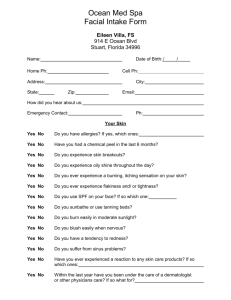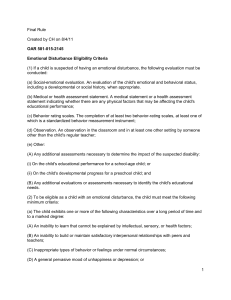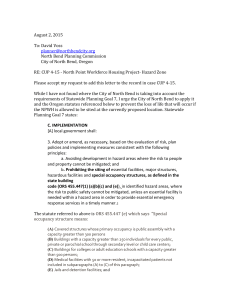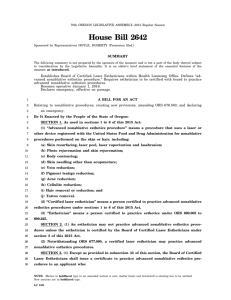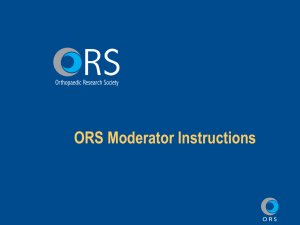House Bill 2642 - Oregon Legislative Information System
advertisement
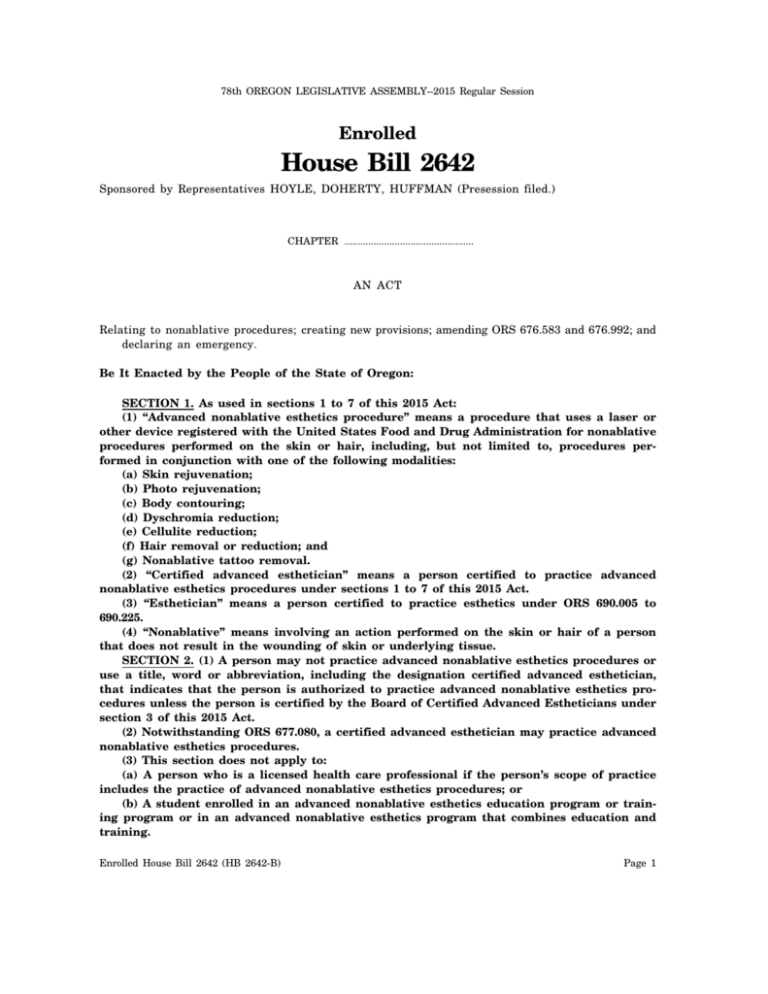
78th OREGON LEGISLATIVE ASSEMBLY--2015 Regular Session Enrolled House Bill 2642 Sponsored by Representatives HOYLE, DOHERTY, HUFFMAN (Presession filed.) CHAPTER ................................................. AN ACT Relating to nonablative procedures; creating new provisions; amending ORS 676.583 and 676.992; and declaring an emergency. Be It Enacted by the People of the State of Oregon: SECTION 1. As used in sections 1 to 7 of this 2015 Act: (1) “Advanced nonablative esthetics procedure” means a procedure that uses a laser or other device registered with the United States Food and Drug Administration for nonablative procedures performed on the skin or hair, including, but not limited to, procedures performed in conjunction with one of the following modalities: (a) Skin rejuvenation; (b) Photo rejuvenation; (c) Body contouring; (d) Dyschromia reduction; (e) Cellulite reduction; (f) Hair removal or reduction; and (g) Nonablative tattoo removal. (2) “Certified advanced esthetician” means a person certified to practice advanced nonablative esthetics procedures under sections 1 to 7 of this 2015 Act. (3) “Esthetician” means a person certified to practice esthetics under ORS 690.005 to 690.225. (4) “Nonablative” means involving an action performed on the skin or hair of a person that does not result in the wounding of skin or underlying tissue. SECTION 2. (1) A person may not practice advanced nonablative esthetics procedures or use a title, word or abbreviation, including the designation certified advanced esthetician, that indicates that the person is authorized to practice advanced nonablative esthetics procedures unless the person is certified by the Board of Certified Advanced Estheticians under section 3 of this 2015 Act. (2) Notwithstanding ORS 677.080, a certified advanced esthetician may practice advanced nonablative esthetics procedures. (3) This section does not apply to: (a) A person who is a licensed health care professional if the person’s scope of practice includes the practice of advanced nonablative esthetics procedures; or (b) A student enrolled in an advanced nonablative esthetics education program or training program or in an advanced nonablative esthetics program that combines education and training. Enrolled House Bill 2642 (HB 2642-B) Page 1 SECTION 3. (1) Except as provided in subsection (3) of this section, the Health Licensing Office shall issue a certificate to practice advanced nonablative esthetics procedures to an applicant who: (a) Is at least 18 years of age; (b) Is an esthetician in good standing with the Board of Cosmetology; (c) Successfully completes: (A) Subject to subsection (2) of this section, an advanced nonablative esthetics education program or training program, or an advanced nonablative esthetics program that combines education and training, that is approved by the Board of Certified Advanced Estheticians; or (B) A nationally recognized program that is approved by the Board of Certified Advanced Estheticians and through which individuals are certified to use lasers or other devices for purposes related to practicing advanced nonablative esthetics procedures; (d) Passes an examination adopted by the Board of Certified Advanced Estheticians by rule; and (e) Pays the applicable fees established under ORS 676.592. (2) An education program described in subsection (1)(c)(A) of this section must be: (a) If the program is located in this state, licensed through the Higher Education Coordinating Commission; or (b) If the program is not located in this state, substantially equivalent to a program licensed through the Higher Education Coordinating Commission. (3) The office shall issue a certificate to practice advanced nonablative esthetics procedures to an applicant who: (a) Is an esthetician in good standing with the Board of Cosmetology; (b) Is authorized and in good standing to practice advanced nonablative esthetics procedures in a state where the requirements to practice nonablative esthetics procedures are substantially similar to the requirements to practice advanced nonablative esthetics procedures in this state; and (c) Pays the applicable fee established under ORS 676.592. (4) The office shall issue a temporary certificate to perform advanced nonablative esthetics procedures to an applicant who: (a) Is an esthetician in good standing with the Board of Cosmetology; (b) Meets any qualifications prescribed by the office by rule; and (c) Pays the applicable fee established under ORS 676.592. SECTION 4. (1) A certificate issued under section 3 (1) or (3) of this 2015 Act must be renewed annually. To renew a certificate under this section, a certified advanced esthetician must submit to the Health Licensing Office: (a) A renewal application; (b) Proof that the certified advanced esthetician has completed any continuing education requirements established by the Board of Certified Advanced Estheticians by rule; and (c) The applicable renewal fee established under ORS 676.592. (2) A temporary certificate issued under section 3 (4) of this 2015 Act expires as prescribed by the office by rule. SECTION 5. (1) There is established the Board of Certified Advanced Estheticians within the Health Licensing Office, consisting of: (a) Nine members appointed by the Governor; and (b) The section manager of the Radiation Protection Services Section of the Oregon Health Authority, or the section manager’s designee. (2) Of the nine members appointed by the Governor: (a) Five must be certified advanced estheticians; (b) Two must be physicians or physician assistants licensed under ORS chapter 677 or nurse practitioners licensed under ORS 678.375 to 678.390; and Enrolled House Bill 2642 (HB 2642-B) Page 2 (c) Two must be public members who are residents of this state. (3) The board member described in subsection (1)(b) of this section is a nonvoting ex officio member of the board. (4) The term of office of each appointed member is four years, but a member serves at the pleasure of the Governor. Before the expiration of the term of a member, the Governor shall appoint a successor whose term begins on January 1 next following. A member is eligible for reappointment. If there is a vacancy for any cause, the Governor shall make an appointment to become immediately effective for the unexpired term. (5) The voting members of the board shall select one of the voting members as chairperson and another voting member as vice chairperson. The board shall establish the terms of service for the chairperson and the vice chairperson and the duties and powers of the chairperson and the vice chairperson. (6) A majority of the voting members of the board constitutes a quorum for the transaction of business. (7) Official action by the board requires the approval of a majority of the voting members of the board. (8) The board shall meet at a place, day and hour determined by the board. The board also may meet at other times and places specified by the call of the chairperson or of a majority of the voting members of the board. SECTION 6. (1) In addition to the powers granted to the Board of Certified Advanced Estheticians by sections 1 to 7 of this 2015 Act, the board shall have the power to: (a) Adopt rules and take actions necessary to carry out the duties of the board under sections 1 to 7 of this 2015 Act. (b) Adopt rules establishing sanitation and safety requirements for advanced nonablative esthetics procedures. (c) Adopt rules establishing a professional code of conduct for certified advanced estheticians. (d) Adopt any other rule necessary to regulate certified advanced estheticians. (e) Provide advice to the Health Licensing Office on issues related to advanced nonablative esthetics procedures. (f) Compile information related to advanced nonablative esthetics procedures and direct the office to disseminate the information to certified advanced estheticians. (2) In adopting rules under subsection (1)(b) of this section, the board shall adopt rules: (a) Requiring a certified advanced esthetician to conduct all advanced nonablative esthetics procedures in a facility for which a license has been issued under ORS 690.055; (b) Requiring a certified advanced esthetician to maintain client disclosure forms that include, at a minimum, disclosure of the existence of professional liability insurance; and (c) Requiring a certified advanced esthetician to enter into an agreement with: (A) A physician licensed under ORS chapter 677 or a nurse practitioner licensed under ORS 678.375 to 678.390; or (B) A licensed health care professional who works at the same location as the certified advanced esthetician and who has the authority to prescribe drugs listed in Schedule III, IV or V. (3) The purpose of an agreement described in subsection (2)(c) of this section is to provide a certified advanced esthetician with a licensed health care professional to whom the certified advanced esthetician may refer a client of the certified advanced esthetician. SECTION 7. In the manner provided by ORS chapter 183 for contested cases, and after consultation with the Board of Certified Advanced Estheticians, the Health Licensing Office may impose a form of discipline described in ORS 676.612 against any person certified under section 3 of this 2015 Act for a violation of the provisions of sections 1 to 7 of this 2015 Act or of a rule adopted under sections 1 to 7 of this 2015 Act, or for commission of a prohibited act listed in ORS 676.612. Enrolled House Bill 2642 (HB 2642-B) Page 3 SECTION 8. Notwithstanding the requirements listed in section 3 (1)(c) of this 2015 Act, the Health Licensing Office shall, until January 1, 2018, issue a certificate to practice advanced nonablative esthetics procedures to an applicant who, in lieu of those requirements: (1) Provides proof to the office of having been employed for not less than 500 hours as a laser operator under the supervision of a health care professional whose scope of practice includes the practice of advanced nonablative esthetics procedures; or (2) Provides proof to the office of having completed 40 hours of education related to laser theory and fundamentals and of having completed 24 hours of practical experience performing each modality listed in section 1 (1) of this 2015 Act. SECTION 9. (1) Notwithstanding the term of office specified by section 5 of this 2015 Act, of the members first appointed to the Board of Certified Advanced Estheticians: (a) Two shall serve for terms ending December 31, 2016. (b) Two shall serve for terms ending December 31, 2017. (c) Two shall serve for terms ending December 31, 2018. (d) Three shall serve for terms ending December 31, 2019. (2) Notwithstanding the requirements for board membership specified by section 5 (2)(a) of this 2015 Act, the members first appointed to the board under section 5 (2)(a) of this 2015 Act may be estheticians who have at least three years’ experience practicing advanced nonablative esthetics procedures. SECTION 10. ORS 676.583 is amended to read: 676.583. Pursuant to ORS 676.586, the Health Licensing Office shall provide administrative and regulatory oversight and centralized service for the following boards and councils: (1) Board of Athletic Trainers, as provided in ORS 688.701 to 688.734; (2) Board of Cosmetology, as provided in ORS 690.005 to 690.225; (3) State Board of Denture Technology, as provided in ORS 680.500 to 680.565; (4) State Board of Direct Entry Midwifery, as provided in ORS 687.405 to 687.495; (5) Respiratory Therapist and Polysomnographic Technologist Licensing Board, as provided in ORS 688.800 to 688.840; (6) Environmental Health Registration Board, as provided in ORS chapter 700; (7) Board of Body Art Practitioners, as provided in ORS 690.350 to 690.410; (8) Advisory Council on Hearing Aids, as provided in ORS 694.015 to 694.170; (9) Sex Offender Treatment Board, as provided in ORS 675.360 to 675.410; (10) Nursing Home Administrators Board, as provided in ORS 678.710 to 678.820; [and] (11) Board of Licensed Dietitians, as provided in ORS 691.405 to 691.485[.]; and (12) Board of Certified Advanced Estheticians, as provided in sections 1 to 7 of this 2015 Act. SECTION 11. ORS 676.992 is amended to read: 676.992. (1) Except as provided in subsection (3) of this section, and in addition to any other penalty or remedy provided by law, the Health Licensing Office may impose a civil penalty not to exceed $5,000 for each violation of the following statutes and any rule adopted [thereunder] under the following statutes: (a) ORS 688.701 to 688.734 (athletic training); (b) ORS 690.005 to 690.225 (cosmetology); (c) ORS 680.500 to 680.565 (denture technology); (d) Subject to ORS 676.616 and 687.445, ORS 687.405 to 687.495 (direct entry midwifery); (e) ORS 690.350 to 690.410 (tattooing, electrolysis, body piercing, earlobe piercing, dermal implanting and scarification); (f) ORS 694.015 to 694.170 (dealing in hearing aids); (g) ORS 688.800 to 688.840 (respiratory therapy and polysomnography); (h) ORS chapter 700 (environmental sanitation); (i) ORS 675.360 to 675.410 (sex offender treatment); (j) ORS 678.710 to 678.820 (nursing home administrators); Enrolled House Bill 2642 (HB 2642-B) Page 4 (k) ORS 691.405 to 691.485 (dietitians); (L) ORS 676.612 (prohibited acts); [and] (m) ORS 676.800 (applied behavior analysis)[.]; and (n) Sections 1 to 7 of this 2015 Act (advanced nonablative esthetics procedure). (2) The office may take any other disciplinary action that it finds proper, including but not limited to assessment of costs of disciplinary proceedings, not to exceed $5,000, for violation of any statute listed in subsection (1) of this section or any rule adopted under any statute listed in subsection (1) of this section. (3) Subsection (1) of this section does not limit the amount of the civil penalty resulting from a violation of ORS 694.042. (4) In imposing a civil penalty [pursuant to] under this section, the office shall consider the following factors: (a) The immediacy and extent to which the violation threatens the public health or safety; (b) Any prior violations of statutes, rules or orders; (c) The history of the person incurring a penalty in taking all feasible steps to correct any violation; and (d) Any other aggravating or mitigating factors. (5) Civil penalties under this section shall be imposed as provided in ORS 183.745. (6) The moneys received by the office from civil penalties under this section shall be deposited in the Health Licensing Office Account and are continuously appropriated to the office for the administration and enforcement of the laws the office is charged with administering and enforcing that govern the person against whom the penalty was imposed. SECTION 12. Notwithstanding any other law limiting expenditures, the limitation on expenditures established by section 2, chapter , Oregon Laws 2015 (Enrolled Senate Bill 5526), for the biennium beginning July 1, 2015, as the maximum limit for payment of expenses from fees, moneys or other revenues, including Miscellaneous Receipts, tobacco tax receipts, provider taxes, Medicare receipts and federal funds for indirect cost recovery, Supplemental Security Income recoveries, Women, Infants and Children Program food rebates, the Coordinated School Health Program, the Edward Byrne Memorial State and Local Law Enforcement Assistance Grant Program, homeland security and emergency preparedness and response services, but excluding lottery funds and federal funds not described in section 2, chapter , Oregon Laws 2015 (Enrolled Senate Bill 5526), collected or received by the Oregon Health Authority, is increased by $386,294 for the purpose of carrying out the provisions of this 2015 Act. SECTION 13. Notwithstanding any other law limiting expenditures, the amount of $118,249 is established for the biennium beginning July 1, 2015, as the maximum limit for payment of expenses from fees, moneys or other revenues, including Miscellaneous Receipts, but excluding lottery funds and federal funds, collected or received by the Higher Education Coordinating Commission, for the purpose of carrying out the provisions of this 2015 Act. SECTION 14. (1) Sections 1 to 9 of this 2015 Act and the amendments to ORS 676.583 and 676.992 by sections 10 and 11 of this 2015 Act become operative on July 1, 2016. (2) The Health Licensing Office may take any action before the operative date specified in subsection (1) of this section that is necessary to enable the office to exercise, on or after the operative date specified in subsection (1) of this section, all the duties, functions and powers conferred on the office by sections 1 to 9 of this 2015 Act and the amendments to ORS 676.583 and 676.992 by sections 10 and 11 of this 2015 Act. SECTION 15. This 2015 Act being necessary for the immediate preservation of the public peace, health and safety, an emergency is declared to exist, and this 2015 Act takes effect on its passage. Enrolled House Bill 2642 (HB 2642-B) Page 5 Passed by House June 30, 2015 Received by Governor: ........................M.,........................................................., 2015 .................................................................................. Timothy G. Sekerak, Chief Clerk of House Approved: ........................M.,........................................................., 2015 .................................................................................. Tina Kotek, Speaker of House Passed by Senate July 2, 2015 .................................................................................. Kate Brown, Governor Filed in Office of Secretary of State: .................................................................................. Peter Courtney, President of Senate ........................M.,........................................................., 2015 .................................................................................. Jeanne P. Atkins, Secretary of State Enrolled House Bill 2642 (HB 2642-B) Page 6

